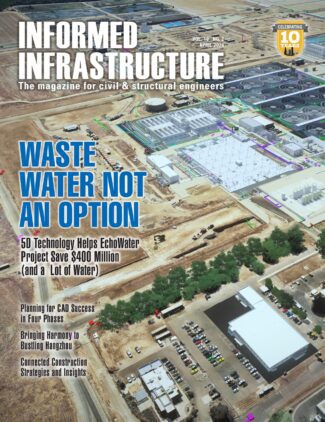London, 14 December 2023 – The Association for Geographic Information (AGI), the membership group for organisations and individuals working in the geospatial sector, is celebrating following a successful annual conference. The largest independent event in the UK GI calendar, organised for geospatial professionals by geospatial professionals, GeoCom 23 attracted more than 250 registered delegates with a challenging agenda featuring topics such as ethics and governance, skills shortages and the environmental impact of earth observation. Feedback from attendees included ‘thought provoking’, ‘positive networking and knowledge sharing’ and ‘a fantastic event’, and plans are already underway for GeoCom 24.
“Once again GeoCom was an amazing success and that is due to the hard work of the organising team, the support of industry sponsors, the contribution of speakers, the backing of partners and the enthusiasm of the sector,” commented Adam Burke, AGI Chair. “I would therefore like to extend my sincere thanks to all individuals and organisations that helped make the day ‘action filled’ and ‘eye opening’.”
Under the theme ‘Intelligent Geospatial for a Sustainable Future’, GeoCom took place on the 5th December at the Royal Geographic Society in London. The conference opened with a keynote presentation from Google’s Geographer Ed Parsons. He challenged the audience to ‘up their game’ in terms of explicit geospatial intelligence before concluding that, as geospatial specialists, we need to help experts from other fields ask the right questions, using geography, in order to get the right answers.
The morning session continued with a panel discussion on the ‘Future of Governance’ and the legal and ethical challenges faced by the geosector in a world of generative AI. Featuring Ed Parsons, Andrew Newman, Principal Data Specialist at the Open Data Institute, Amanda Brock, CEO at OpenUK, and Denise McKenzie, Managing Partner at the PLACE Trust, the opening gambit was ‘without data there is no AI’. Examples of good, and bad, use of AI, were given before urging the sector once again to raise its voice to protect its importance.
The morning session continued with Sarah Hodgetts, newly appointed Interim Director of the Geospatial Commission, who presented the UK’s Geospatial Strategy 2030, and Alina Taylor, Business Development Manager at Fugro, who showed how it is converting data into actionable information to shape infrastructure projects. Karen Anderson, Professor in Remote Sensing at the University of Exeter, revealed the environmental impacts of collecting, storing and using earth observation data, before Damien McCloud, Director at Arup addressed the problem of Urban Heat Islands concluding that ‘data is just data unless action or change happens as a result of its use’.
After a lunch break, during which delegates were encouraged to interact with event sponsors Esri UK, Bluesky, Cadline, CGI, GIS-Jobs, Idox, NV5 Geospatial, Verisk, 1Spatial, Cadcorp, GeoPlace and Spyrosoft, as well as partners British Cartographic Society and Government Geography Profession. Jules Cullen, Head of Sustainability at Esri UK, then opened the afternoon proceedings. Presenting on behalf of Rob Stoneman, Director of Landscape Recovery at The Wildlife Trusts, she revealed the importance of peat and the work that is being undertaken to preserve and repair these valuable landscapes.
Antria Christodoulou, GIS Developer at Tensing, then explained how generative AI is more than just ChatGPT, and showed examples of other platforms and other applications, before asking for patience, because with new models developed everyday ‘things will only get better’. Calum Booth, Global Product Specialist at Vodafone, then gave examples of the insights that can be derived from mobile phone data before a panel discussion, featuring Mary Spence MBE, a Cartographic Design Consultant, Steve Attwell, User Experience Practice Lead at Ordnance Survey, Clare Seldon, Associate (Cartographer) at Steer and Joe Hiller, Director of Analysis at Natural England, explained what cartography meant to them and explored the potential impacts of AI / ML.
The conference concluded with Pascal Coulon, Director Consulting Expert at CGI, who revealed that seagrass is 30 times more efficient at removing carbon than rainforests and demonstrated how this resource is being mapped, before Ian Maxfield, Associate Director of Geospatial Services in the NHS and co-chair of the AGI’s Education and Skills working group, together with Joseph Dudley, Director of the Space Skills Alliance, engaged the audience to explore the future of geospatial skills.
In addition to the formal agenda GeoCom also featured a lunchtime networking session jointly hosted by the AGI Early Careers Network working group and the Royal Geographical Society, with IBG. Providing an informal opportunity for discussions on chartership the gathering included contributions from a number of professional bodies. The AGI also convened a breakfast roundtable meeting to discuss the future of skills within the sector. Attended by representatives from organisations such as the GGP, RGS, CICES and RICS discussions were based around the findings of the recently published AGI Skills Survey Report.
–

